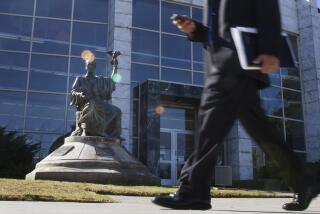Jury Deadlocks in Letter-Bomb Trial; Mistrial Declared
- Share via
A federal judge declared a mistrial Friday in the case of a millionaire real estate broker and an Israeli-American woman charged with mailing a fatal letter bomb to a Manhattan Beach computer company after jurors announced that they were hopelessly deadlocked.
After five days of deliberations that some jurors said disintegrated Friday into a shouting match, the jury announced that it was deadlocked 6 to 6 on the real estate broker, William Ross, and was leaning 10 to 2 in favor of convicting his alleged associate, Rochelle Manning.
Federal prosecutors said they do not know whether they will seek to retry the case, but defense lawyers said they will ask U.S. District Judge Dickran Tevrizian next week for judgments of acquittal.
“Of course, I’m disappointed that he wasn’t acquitted completely. The man is innocent, and I think the jurors indicated there was a strong feeling as to his innocence,” said Mitchell W. Egers, attorney for Ross, a Hawthorne real estate broker accused of hiring Manning and her husband to mail the bomb as a result of a business dispute.
Assistant U.S. Atty. Nancy Wieben Stock had described Ross, 52, as a man of “quiet cowardice” who became enraged when Manhattan Beach businesswoman Brenda Crouthamel Adams demanded repairs on a bungalow he was selling her and refused to give him an exclusive listing on her own home.
Prosecutors said Ross contacted Manning’s husband, Robert Manning, an old associate of his from the Jewish Defense League, and hired the Mannings to mail a bomb to Adams’ computer company in July, 1980.
A secretary for the company, Patricia Wilkerson, 32, was killed when she opened the parcel, plugged it into the wall as an accompanying letter instructed, and the device exploded.
The prosecution presented evidence that Rochelle Manning’s fingerprints were found on the letter and Robert Manning’s fingerprints were on the cardboard package in which the device was mailed.
Prosecutors also tracked two telephone calls from Ross’s office to the office and home of Robert Manning on the day of his argument with Adams. Robert Manning is also charged in the case, but he is a fugitive, now living in the Israeli-occupied West Bank.
Ross’s attorneys said there was no evidence that it was Ross who made the telephone calls and argued that the wealthy businessman, who owned nearly a dozen pieces of property in Los Angeles worth $1 million, had no reason to kill someone over the sale of a modest bungalow.
Manning’s attorneys, Michael Adelson and Alan Rubin, said her fingerprints could have gotten on the letter “in a hundred ways at a hundred different times” and undoubtedly got there before the letter was typed.
One member of the jury, William Farrer, a Huntington Park teacher who held out for acquittal of both defendants, said jurors began shouting in frustration toward the end of their five days of deliberations, although he admitted, “I was by far the most abrasive person.”
“I just didn’t think the evidence was there for either of them,” he said.
With Manning, he said, “the evidence was incontrovertible that she touched the paper, and believable that she may even have folded the paper. But it’s a very long step from that to conclude she had the intent to kill.”
Farrer said the purported link between Ross and the Mannings was “very weak.”
“Most of the testimony seemed to center on the two phone calls (from Ross’s office) and it wasn’t proven who the parties were on either end of the phone calls,” he said. In addition, he said, “there was no proof that the so-called confrontation (between Ross and Adams) was anything out of the ordinary.”
Adams, he said, was a “strong-willed” woman who herself listed as many as 15 people who might “harbor grudges” against her.
Another juror, Dillena Okray, also said the government’s case was not strong enough.
“To me, the evidence that was presented was pretty weak, and the jury was more or less put in a situation where they had to grasp at straws to reach any kind of decision,” she said.
Okray admitted that the fingerprint evidence against Manning was strong, but was not conclusive, she said. “We didn’t rule out the idea that she typed it, but why would she type it, knowing that it was going to be sent with a bomb?”
The judge scheduled a hearing for next Friday to set a new trial date and consider any motions from the defense.
More to Read
Sign up for Essential California
The most important California stories and recommendations in your inbox every morning.
You may occasionally receive promotional content from the Los Angeles Times.













